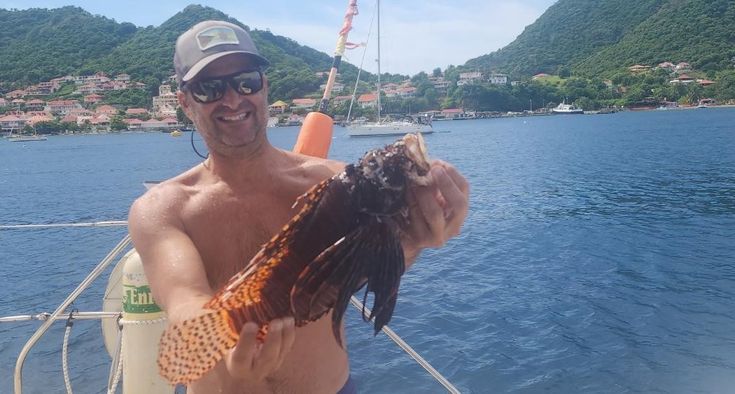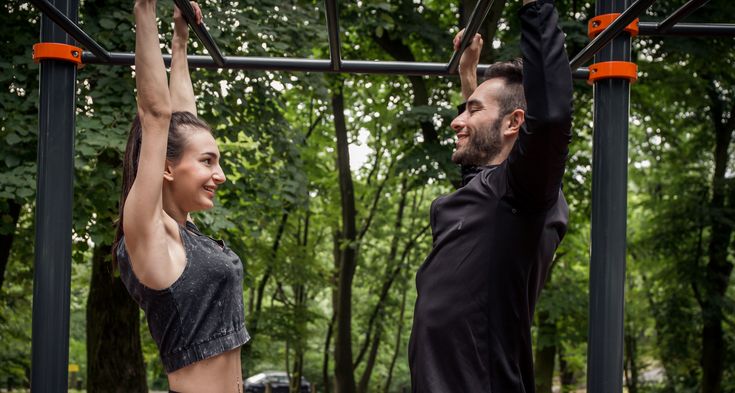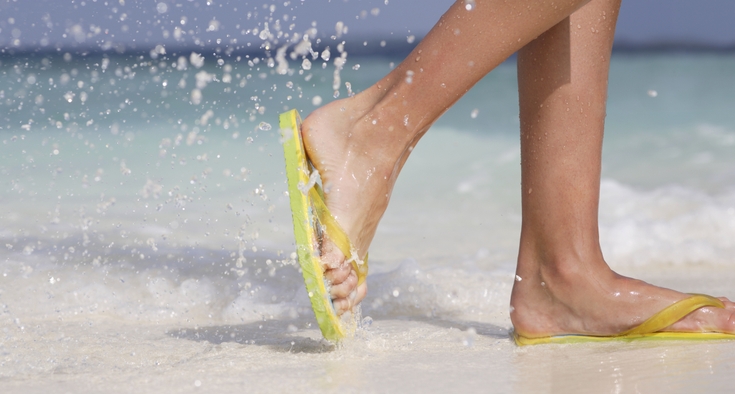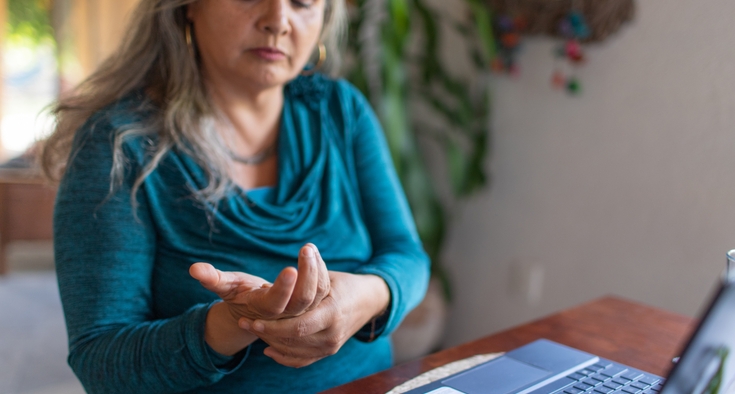You could say Brad McQueen of Charleston had bad luck on a May 2024 fishing trip in the U.S. Virgin Islands.
But you’d be overlooking all the good luck he had immediately after his hand was bitten by a barracuda.
You’re more likely to be struck by lightning than attacked by a barracuda, a torpedo-shaped carnivorous fish that lives in tropical and subtropical waters. It’s such a rarity that figures are scarce. But according to the St. Thomas Dive Center website, “there have only been 25 reported attacks on humans in the last century.”
It’s the first barracuda injury Dr. Kyle Kokko (pronounced like “cocoa”), who operated on McQueen, had ever seen. The hand and wrist surgeon at the Hand Institute of Charleston in Mount Pleasant is used to treating maritime accidents. Just not one caused by a severe fish bite.
From head to foot, Novant Health's orthopedic specialists have got you covered.
‘Blood in every direction’
McQueen, a territory manager for a residential elevator company, was fishing offshore St. Thomas with his childhood friend, Rusty Day, a boat captain and marine biologist. They dove for lobster, cooked them on Day’s charter boat and made garlic butter for dipping. After dinner, McQueen rinsed the butter bowl in the ocean. The splashing, plus the boat lights, attracted a barracuda – a big one. McQueen said it could’ve been 6 feet long.
Since butter had dried in the bowl, McQueen was really working to get it all out when the barracuda bit the bowl – and his left thumb. “I started screaming,” he said. “Rusty was cleaning the kitchen. He came up, saw the blood … got a first-aid kit and wrapped it enough to stop the bleeding. At that point, I felt all right. I told Rusty there was no reason to … move the boat at night.”
Day thought otherwise. He asked if McQueen could move his thumb. He couldn’t.
So, Day recalled an old friend he’d known from his time in Charleston as a Ph.D. researcher at a marine biology lab – Kokko.
Kokko still has the text from May 18, 2024, at 11:54 p.m. “Rusty sent me some pictures of Brad’s thumb,” Kokko said. “I asked him the usual questions – Can you move it? Can you feel it? Can you bend it? The answer was ‘no’ to all of them. And there was numbness on one side.”
Kokko suspected the bite had impacted tendons and nerves and advised McQueen to get back to Charleston as soon as he could.
Day ferried his friend to St. Thomas – about a 45-minute trip – and called the hospital on the way to alert them. “There was so much blood going in every direction,” McQueen said. “I wasn’t quite sure how much of a thumb I had left.”
Once they docked, McQueen hailed a cab to take him to the hospital. He called Kokko from the ER that Saturday night and scheduled an initial appointment for Monday morning.
What not to do
The ER doctor in St. Thomas tried – many attempts – to numb McQueen’s thumb before stitching it. “That was the worst pain I've ever had in my life,” he said. “The hospital didn't have any antibiotics, so they gave me a script for the next day. But in St. Thomas, everything's closed on Sunday. I didn’t get my first antibiotic until around 11 Sunday night, when I got back to Charleston.”
The ER doctor did give McQueen medical advice, though. Bad advice. He said to allow his thumb to heal for a week to 10 days before seeing a doctor.

Kokko’s advice: Don’t wait. He said, “When you hit a tendon and a nerve, urgency is key. You have a little time, but you don't want to let the thing heal. Don’t lollygag about finding expert care.”
If Day hadn’t taken quick action, and if Kokko hadn’t responded quickly, McQueen could have lost significant function in his thumb. And that’s the last finger you’d want to lose function in. “The thumb is our most important digit,” Kokko said. “It’s what separates us from the apes.”
It didn’t take long for McQueen to discover how valuable that opposable thumb is. “You don't realize how much you need your thumb until you don't have your thumb,” he said. Buttoning pants, zipping a zipper, tying your shoes – all pose a challenge when your thumb isn’t functioning properly.
This was no ‘avocado injury’
Three days after Kokko examined McQueen’s thumb, he operated on it. It’s one of the most complex procedures a hand surgeon can perform: repairing nerves, tendons and bones. The only thing that could have made it more intricate, Kokko said, was if he needed to repair an artery.
When he worked at a Level 1 trauma center, Kokko treated severe injuries caused by boat propellers and table saws. These days, he’s more likely to see injuries caused by lawnmower blades and kitchen knives. “One injury we see repeatedly is an avocado injury,” he said. “When you slice around the big seed and remove half of it with a sharp knife, if you don’t catch it – and you start twisting the knife – it can slip and slice your hand. That can be a bad injury.”
Not as bad as one caused by a barracuda, though. “A sharp knife or razor blade typically makes a nice, clean cut,” he said. “With a saw blade or a barracuda, your skin gets really chewed up. Tendons can get mangled.”
The power of PT
Once Kokko’s job was complete, McQueen’s job began in physical therapy.
“I often say it's like football preseason,” Kokko said. “You’re exercising the hand, constantly working it. And there are no off days. I equate the regular season to the rest of your life. It takes a lot of dedication.”
McQueen worked with a therapist at the Hand Institute of Charleston three times a week. He did exercises at home, too.

The work paid off. When he first started therapy, McQueen estimated he had only about 5% mobility. Kokko said his functionality is now up to about 70%, which he called “a grand slam,” adding, “That’s about as much as you can hope for in this scenario. He’s got a strong, functional thumb, and he can do anything he wants.”
McQueen recently peeled 50 pounds of shrimp by hand and realized just how much function he has back. He’s now a believer in PT. Before this experience, he said he probably would’ve dismissed it. But he can’t argue with results. “Twelve weeks into physical therapy, I was amazed by how much more mobility I had,” he said.
Lessons learned
Chances are, you’re never going to be attacked by a barracuda. But you may injure your hand. Here’s what to know:
- See a doctor ASAP. “The sooner you attend to an injury, the better chance you have of a good outcome,” Kokko said. “It’s not something you should wait a week to take care of.”
- See a specialist. They can help you avoid long-term pain and nerve damage, Kokko said. Look for a fellowship-trained hand surgeon. That means the surgeon has completed additional training after his or her medical residency.
- Get home quickly if you’re somewhere lacking in top-notch medical care. “But even before that, call your doctor’s office back home and get something on the schedule,” Kokko said. “Don’t mosey back and then call around and see who’s available. Get on the horn immediately to find an expert.”
- Use your injured digits after surgery. “Don’t restrict yourself,” Kokko said, “and you might get a couple of degrees better over time.”
After one unlucky – and unlikely – incident, McQueen had plenty of good luck on his side.
“The fact that Brad was out of the country and happened to be with a guy I know – and that that guy knew how to help him immediately – things kind of fell in line for him to get a really good outcome,” Kokko said. “The stars aligned.”










